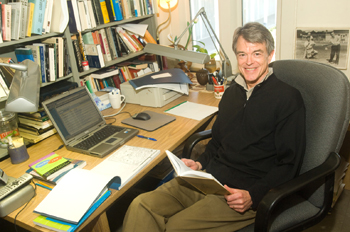A Literary Light Reclaimed from Scandal
 |
UAlbany Professor of English Randall Craig sheds light on Caroline Norton's literary career in his new book. (Photo Mark Schmidt) |
Caroline Norton was a skilled writer and poet who fought to change the legal rights of married women in Victorian England. She is remembered primarily, however, for one thing: scandal.
The striking beauty had a promising career as a writer until she was accused by her husband of having an affair with Lord Melbourne, Queen Victoria's first prime minister. The repercussions of that adultery trial, or "criminal conversation" as it was known, were felt for more than 40 years. Charles Dickens, a newspaper reporter at the 1836 trial, would later fictionalize Norton's story in The Pickwick Papers.
While adultery was never proven, the fallout was to wreak havoc on her life and career, and overshadow her contributions to the literary world, said UAlbany English Professor Randall Craig, who has shed new light on Caroline Norton as a writer and legal advocate in The Narratives of Caroline Norton (Palgrave Macmillan, 2009). "It was a formula for a miserable life. Her children were taken away, and Norton remained under the legal authority of her husband," said Craig, who joined UAlbany in 1981.
 |
Craig discovered the handwritten manuscript of Norton's first, unpublished novel, Love in "the World." (Photo Mark Schmidt) |
Norton's fight for custody led to the first legal rights for mothers in 1839. While now considered a Victorian feminist, contemporaries accused her of fighting for women's rights only when personally convenient.
Craig's book encompasses three stories: Norton's; those that were told about her by fellow authors, including Thackeray, Meredith, and Disraeli; and those perpetuated by Victorian society and the legal system about women, social roles, and careers in general.
"For almost 50 years, Norton was sensationally visible at the intersection of these three narratives, with the paradoxical result of being practically invisible as an author and inaudible as a voice of the rights of wives and mothers," he said.
With partial funding from UAlbany and UUP, Craig conducted extensive archival research for the book. This included work in the Beinecke Library at Yale University, where he discovered the handwritten manuscript of Norton's first, unpublished novel Love in "the World."
![]() For more news, subscribe to UAlbany's RSS headline feeds
For more news, subscribe to UAlbany's RSS headline feeds


